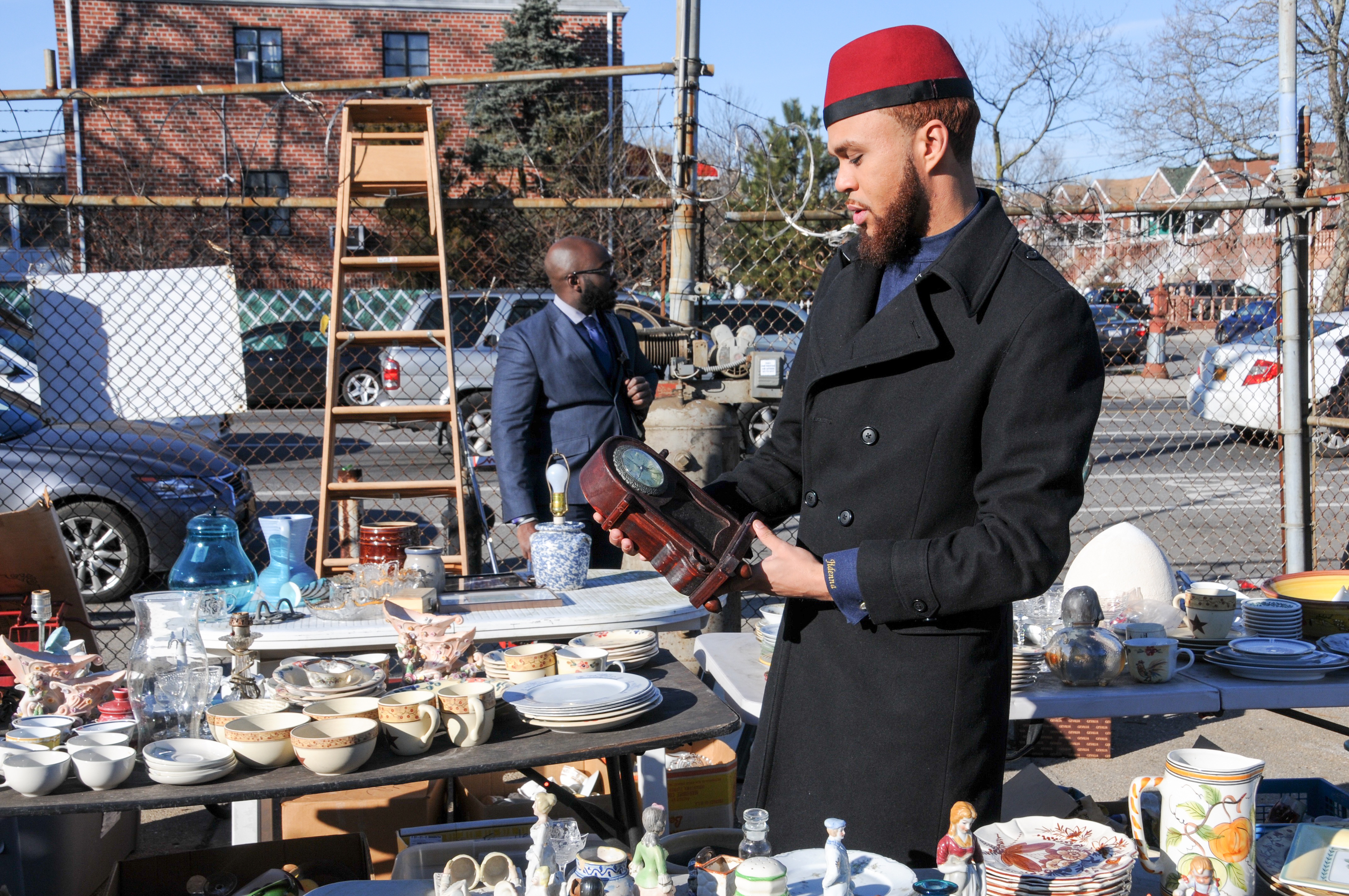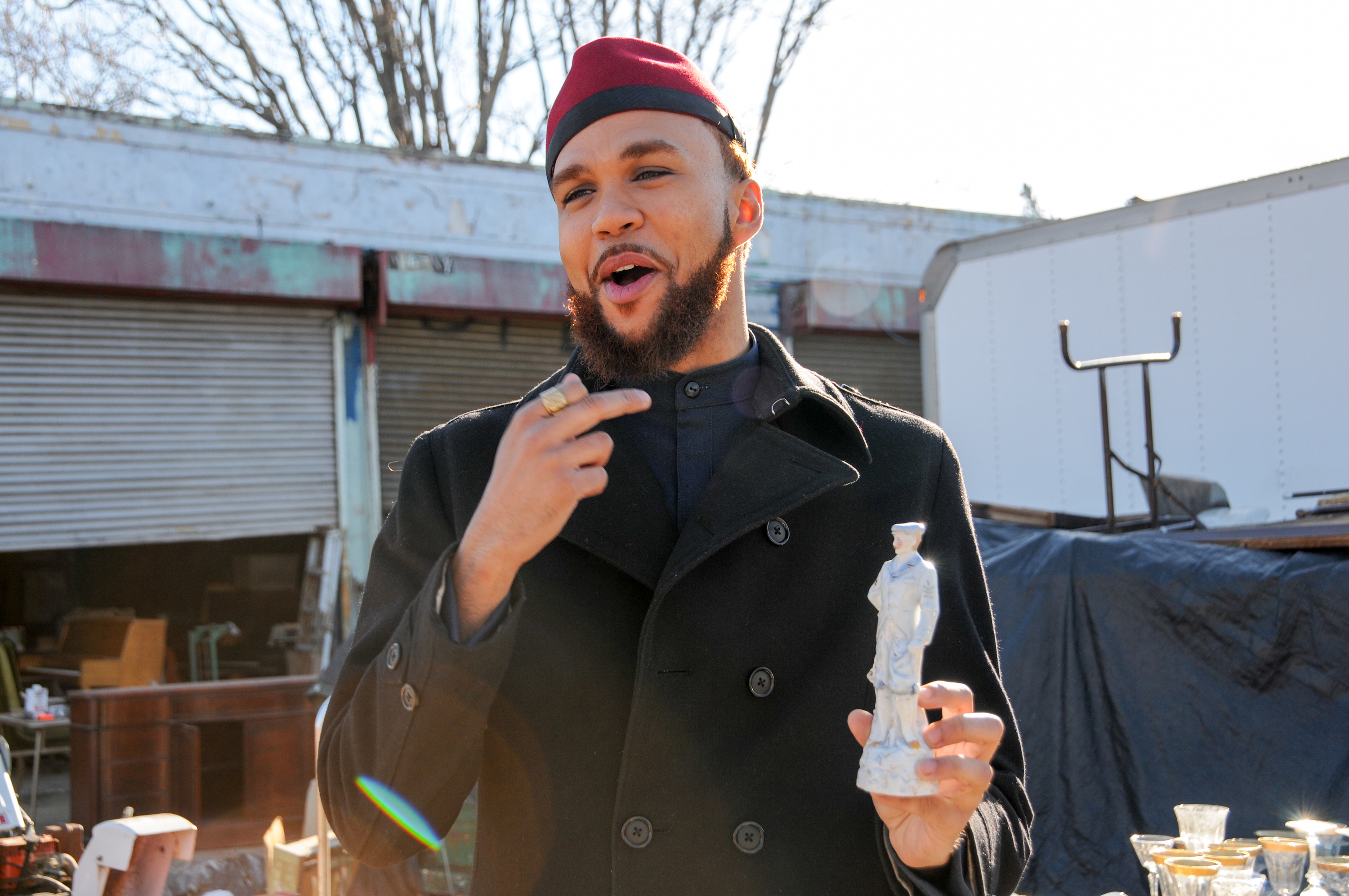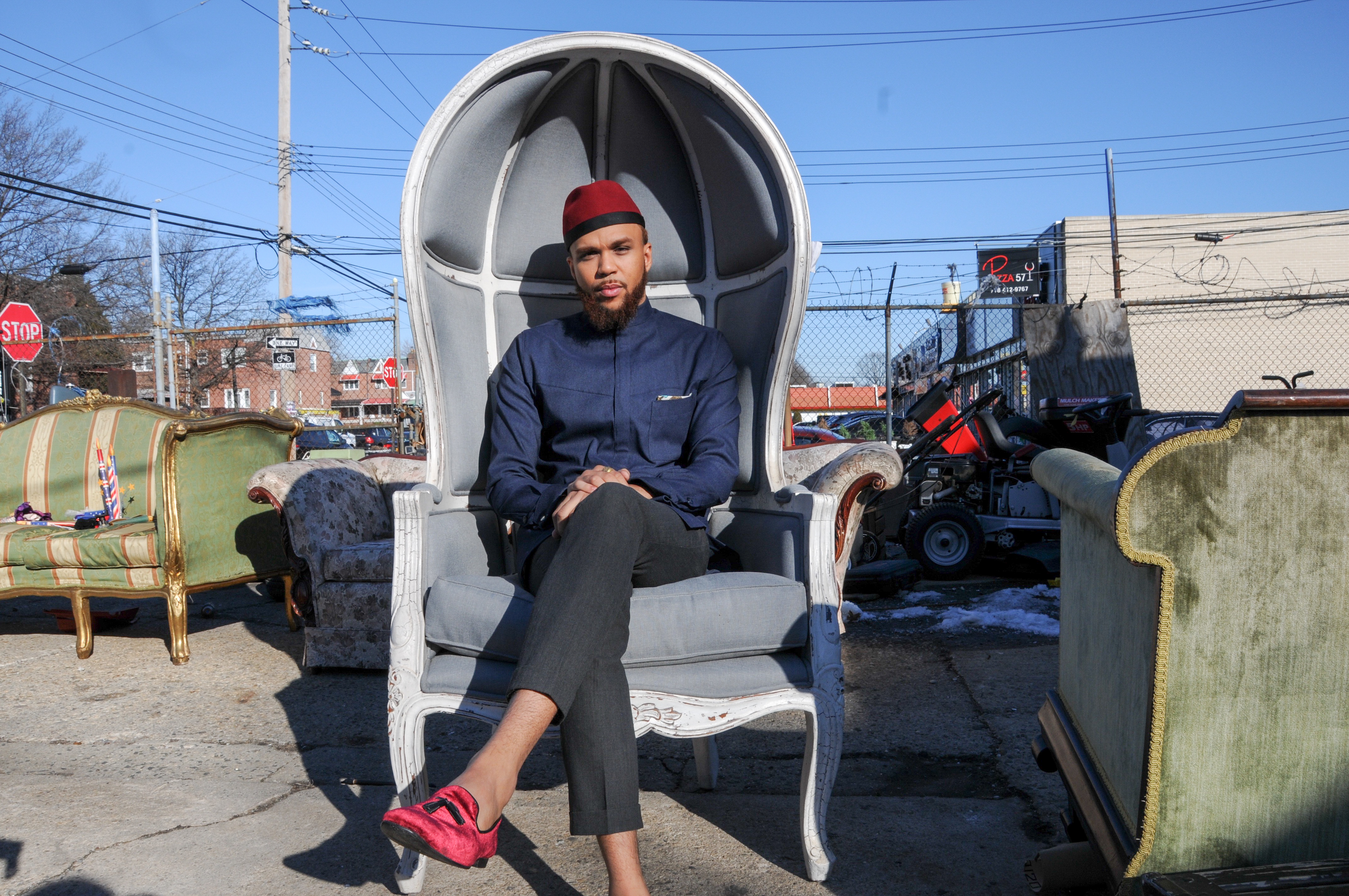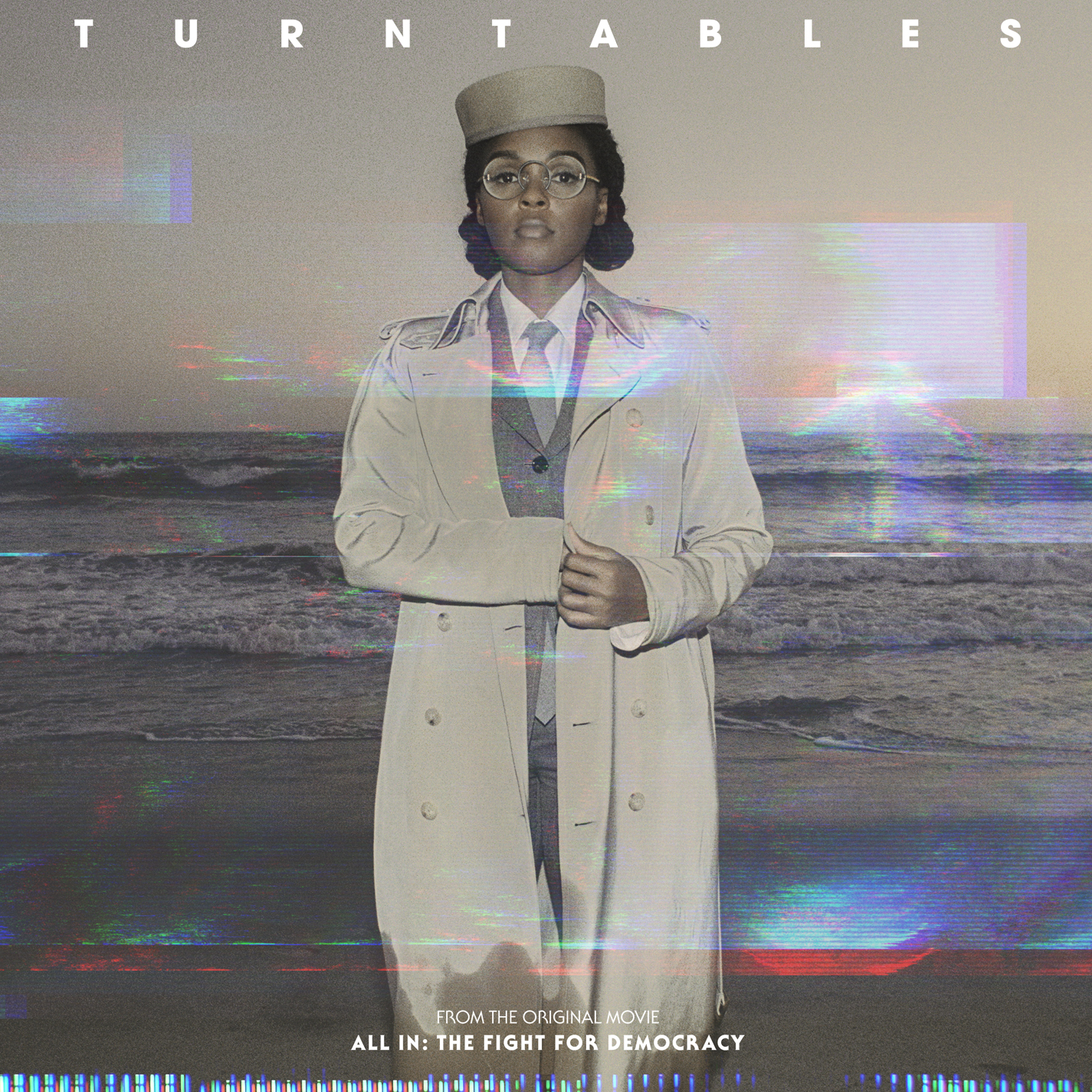With his slick amber hair and proclivity for three-piece suits, Jidenna is a walking anachronism in most places. The look compounded with his politically charged charisma forces an unsurprising question: Is he a model citizen or a playing a character? The 31-year-old Wondaland Records signee would say it’s neither, that the aesthetic is simply a smooth extension of his biography. Even 2015’s “Classic Man”—the breakout hit swanky enough for a Kendrick Lamar remix—draws from a specific experience. The scenes where he’s staving off police officers and tutoring young men parallel those of his home community of East Flatbush, where neighborhood civilians handled mild controversies like car accidents before calling the police. So, the “Classic Man” in the song is also a hat tip to a deceased neighborhood OG named Alex, who Jidenna remembers breaking up fights when he was younger.
That depth of subject matter is probably not something you’d immediately gain from listening to his most famous song, but it’s not the case for Jidenna’s exceptional debut album The Chief, where his ethos and heritage forms the album’s backbone. The LP’s sonic versatility draws inspiration from East Flatbush—where the Caribbean diaspora lives in urban cacophony—and Jidenna’s own Nigerian background. The Chief tends to be at its best when those signatures cavort at the forefront: “Bambi” has the tropical swing of a trap-leaning Harry Belafonte; cuts “Adaora,” “Little Bit More,” and “The Let Out” are threaded by strands of Nigerian highlife and pidgin English. Jidenna’s late father Oliver Mobisson, the trailblazing computer inventor from whom Jidenna borrows his tailored suit style, guides this effort, too.
“My dad was like, ‘If you’re gonna do this music thing, you better invent something,’” Jidenna tells me on the day of The Chief‘s release. We’re sitting at Suede, a Caribbean restaurant in East Flatbush, within walking distance from where I grew up. “He was like, ‘Be innovative at all costs. Don’t go in there looking like anybody, don’t make no music that sound like anybody.’ So that pressure, that came from him.”
The album is also the cap to an extraordinary 2016 for the collective of musicians who make up Wondaland. The label remained attached to the zeitgeist without releasing a single album: Last year saw a breadth of black stories receiving blockbuster platforms, with Jidenna and label founder Janelle Monae in their midst. Best Picture nominees Moonlight and Hidden Figures are Janelle Monae’s first two live-action film roles. Jidenna showed up in Netflix’s Luke Cage and appeared in HBO’s Insecure, in a wife beater at that. When the chopped and screwed version of “Classic Man” showed up in a pivotal scene in Moonlight, a film that deconstructs black masculinity, the song’s vision of a benevolent alpha male rang purposefully mordant.
Jidenna’s astonished when I rail off these roles during our discussion. “I don’t sit there and scan through social media much.” Jidenna says. “I don’t know how popular we are. I’m still living like down the street. I can’t tell. But when I’m talking to you and thinking about it”—he takes a breath—“Classic Man” was in Moonlight. Like, pivotal-ass scenes.”
He’ll have time to truly take stock of his accomplishments, but not before he’s finished with his promo run–the day after we spoke, he went to New Orleans for All-Star Weekend festivities. The night before, he was at the Meatpacking District for his album release concert. (The show itself had the feel of a house party that happened to take place in a high-tax bracket district: The room smelled of perfume and hair product as Jidenna danced and sang his lain hair into a tangle of curls by night’s end.)
For all of his modesty, Jidenna spent about an hour preparing himself for our interview–in a tinted Chevy Suburban parked right outside of our meeting place. But he’s otherwise very present and careful when he speaks, considering his answers as he massages his beard and scratches his hair, which briefly puffs like a just-lit stove when he lifts his red kufi. Jidenna converses like a man who’s assured but still in transition: He’s navigating through a new political climate and out of his three-piece suit phase.
For you, what differentiates East Flatbush from the rest of New York?
What’s interesting about East Flatbush and the area I lived at in Boston when I was in high school was that they were similar neighborhoods. It was Caribbean-American—predominantly Haitian, Trini, and Jamaican—and Nigerian. My music, at least my perspective, is really shaped by all of that. That’s why you’ll see bits of rock steady or reggae. You’ll see bits of Brazilian music and Nigerian music, and of course hip-hop, soul, funk, and all of that good stuff.
After spending time as a public school teacher, did it feel like a transition coming from teaching to music?
I never wanted to teach. I did that because I needed money, and I lucked out because it was a hip-hop academic program and I had to make music that the children liked. So I’m studying hip-hop and “urban” music and then putting rhymes to it in a way that sounds good. So I’m studying trap, studying Katy Perry and whoever’s hot at the time and bringing it to the kids. It was a natural transition to where I can rap and talk shit the way that I wanted to and not have to talk about integrated algebra and U.S. History. “Classic Man” was made in between making songs for the hip-hop education program. I was just like, “Man, I gotta get out of this.” So I just burned one down real quick and made ‘Classic Man’ as an exercise.
How did you and Janelle Monae end up having that first meeting at that masquerade ball?
I’ll tell give you the whole story: Facebook, we saw it early at Stanford—because it was in the Ivy Leagues and Stanford before anybody. That was the testing ground. So I saw the social media world and people just being so into themselves, their friends, and the obsession with screens early. We wanted to make a response to that, so we made this thing called Masquerade Ball. We’re dressing up, we’re fly as fuck—whatever that means, you didn’t have to wear a suit—but the biggest thing was everybody had to wear full paint on their face. The rule was staring was legal. You could stare at anybody. Imagine everybody in a mask here. I don’t know who these people are, but I could just look at them, which is totally different from regular society. So, our focus was human intimacy—no phones were allowed and nobody without a mask was allowed. That was kind of a response to Facebook: A Facelook, if you will.
We invited Janelle to that because we felt she was peculiar and dope and weird enough for the shit that we were doing.
You finished recording The Chief a while ago but recorded a few more songs. Which songs were they?
Really I was done by spring of last year. And then we had journeys, waiting, and promotion, so I said let me make another album. The additions were “Trampoline,” “The Let Out,” “Bully of the Earth,” and “Safari.”
I could hear the Nigerian influences on “The Let Out.”
I did that in a clutch right after Thanksgiving. Me, Nana [Kwabena, the song’s feature] and [collaborator] Andrew Horowitz made that in like one week, start to finish. The video showed the inspiration. When I go home for the holidays, we go see our cousins, year-round—people we ain’t seen in a minute. The elders go to sleep, you got your red cup, your party, your pregame. When you’re at the house, you go out to party. I wasn’t dressed up in no suit. I was dressed in a hoodie and snapback, or whatever. I’ve worn that more of my life than suits, you know. I’ll show people that too, this year.
But it’s become your thing.
I leaned into it, but I gotta show people I’m as versatile as my music is. But we’d go out late, purposefully, so we wouldn’t have to pay for shit. Nana made that beat. I was like, “yup,” and the verse came quick.
You moved around a lot coming up. Why the constant movement and what brought you to Brooklyn?
Well, my family is from two different continents, so that’s already gonna change things. And my mom’s family is from Wisconsin, but she lived in Boston, so off the top that’s three different places. School took me to California, and post-school I wanted to work to make it in the music industry, so I moved to New York.
My sister was like, “you gotta come out here,” Brooklyn’s poppin’. It’s funny: I didn’t find the music scene I thought I’d find, but I came into my own as a man out here. I worked my ass off here, bro. I had four jobs a day. You’ve got to to keep the house afloat to pay the bills. I’ve never worked that hard in my life. I was out running on this very street, in a suit, in an 1800 suit, and some shoes I got from Zara, and the soles were worn. And I only had one pair of shoes—that was it. I had my little thrift shops suits and my one pair of shoes that matched all of ‘em. They were grayish black, and I would just run, get on the bus, hop on the train, work here, go to this program, go to this job. I think it toughens you, and that’s why I came into my own out here.
What’s the point where things started to change, from doing jobs to music?
I had a plan to exit school and teaching. I saved up my money. I’m frugal: Let me stack up where I can buy time. A lot of people buy things; I buy time. I bought time, months where I could just work on an album.
In that time, when I was leaving school, this must have been early 2014. I hadn’t even heard of “Fancy.”
So it was “Classic Man” then “Fancy”?
[The songwriting credits] says it samples it because we didn’t wanna get sued. But I didn’t hear it before we made the record. Once we heard it, we were like, “Oh, yeah, super similar.”

You went to the same school as Insecure creator Issa Rae and Luke Cage showrunner Cheo Hodari Coker. That was a dope connection to have in 2016.
I can’t believe they gave me the slot, man. Issa, I had only met once or twice, but Issa was my homie. It’s the Stanford connect. I get free vaporizers from the Stanford connects. I get in hella rooms, just because of that school connect. I’m bragging about it so the little kids know the benefit of school that nobody tells you. “You gotta go because you gotta get a better job.” That’s not what I wanna hear. I wanna hear that I can win. I wanna hear that I’ma be on that screen. [He points to the restaurant’s television screens, which are playing CNN and ESPN.] I wanna hear that this is the way that I can get out of my situation and change the game and fuck shit up, man. I don’t want job safety.
Not play the game, but beat the game.
You wanna beat the game. That was my way, man.
You ever worried about distancing yourself from listeners—and the kids—with these suits?
I knew that kids would like it. What I’m more worried about… maybe not “worried,” but I wanna make sure… is that I show all sides of myself. Or most. I know Chappelle said don’t sell every side of yourself, but I want to share more, and that includes dressing down sometimes. That’s honesty. It’s funny because if I do it now, people are like, “Whoa, is he trying to…” Nah, I do this. I’ma ease into it, so motherfuckers don’t think that, you know? If the kids see me in some jeans here and there, even with a snapback, they’ll know, sometimes, they can wear a suit, but it’s not like they always have to wear it. So I think it’ll be fine, I just gotta roll it out right this year.
And you were in DC for the Women’s March. What propelled you to make the trip?
You know how many people were born from women? All. Everybody. That was the one day that women were prioritized after being de-prioritized in so many countries, and in so many societies in this world. I had to be there. I don’t think you’re an asshole for not going, marching is not the only way to part of it. But I personally wanted to show up and show my face and be an ally. We got a lot of work to do, beyond the march. There’s even little nuances that I do that I’m aware of in a conversation. I’m more likely to interrupt a woman than I am a man. So these are things that I have to fix in my life. I do think we’re on a positive slope, and I never seen women that happy in my life.
I’m relatively progressive, a liberal, and I’m unapologetically that. I’ll be a jerk if I need to be about liberal shit. I’m not fucking PC, I’m aware of things I do. If somebody calls me out for some racist shit I say or some misogynist or sexist shit I say, then yeah, please call me out. At the same time, I think that this PC culture we live in is dangerous. It doesn’t allow people to mess up, it persecutes people, for having one little mistake.
What do you think your audience looks for in your music?
I’m at an interesting point where it’s predominantly people of color. A show is like people from the Middle East, people from the African Diaspora, and women. It’s funny: It’s everybody that Donald Trump has cast away and offended. So the people I see the least is white men.
Yeah, a lot of yours and Monae’s audience are still people of color.
It’s interesting, right? When we do tours, it’s still people of color. I remember talking to the Roots—I was talking to Tariq, I was talking to ?uestlove—they were talking about that shift, going from Philly out to the world. It ain’t happen to us yet.
Are you concerned that the idea of masculinity is archaic? Seems like you talk a lot about what a man should be.
No, I never say what a man should be. It tells you what kind of a man I am. If you listen to the album, you know who the fuck I am, bro. You know exactly, if I have to stab you and it’s gonna be in the front, I’m gonna tell you exactly what the hell I’m doing. I’ve done it, if I gotta go through a dangerous territory, I’m ready to kill, if you’re a woman and you’re with me, I’m with you and I’m committed and I adore you. If we meet at a party, I’m thinking about the night. But I also don’t want a one-night stand, I want a little bit more than that, you know what I’m saying? I’m a say some shit that’s gonna offend you, somebody’s gonna feel some kind of way. The whole album is who I am, but I don’t ever go in there like, “A man should do this. This is what makes a man,” you know? Nah man. This is what I believe. This is what a man looks like for me, this is what a Chief looks like for me.
When I was in school teaching, it was mostly women who were teaching, which was fine. But the boys, man, they needed someone—role models. I think that’s why I’m so focused, on manhood and the chief. Like you said, manhood is not a monolith. I’m not a big guy, I’m not a fucking diesel, the Rock walking around here. But I hold myself that nobody gonna punk me these boys to see, your might doesn’t necessarily come from fighting all the time. It can come from the way you carry yourself.
How do you section off your time between Atlanta and East Flatbush?
I have no idea. I don’t really know what I’m doing until the day of or a couple days before, even though it’s on the calendar. Atlanta is kind of the place I go to produce and make new music. I come to New York to feel people. I’m just working a lot now. It’s not what it was. But when I was in the album mode, needed to feel it, man. I remember Common on “Respiration” where he was like ,“sometimes I take the bus home, just to touch home.” I know that, man. I get that.
Is Moonlight going to beat La La Land for Best Picture?
Man, I don’t know. I wanna see Moonlight win, I wanna see Hidden Figures win. And you know what’s great? A win on any of these shows and films we were talking about feels like a win for us all.






